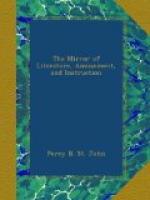In days o’ langsyne as auld chronicles
tell,
When clans wi’ their dirks gaid
to it pell mell,
O he was sad’ that a’ fewds
cou’d expel,
Sae here’s to the memory o’
Andrew,
To Andrew the auld Scottish saint.
For since at the Spey when M’Duff
led the van,
He vow’d that the charrians[5] he’d
slay every one,
But by Andrew’s doctren he slew
na a man,
Sae here’s to the memory o’
Andrew,
To Andrew the auld Scottish saint,
When he to the Culdees the truth did explain
They a’ rubb’d their beard,
an’ looket right fain
An’ vow’d that his council
they’d ever retain,
Sae here’s to the memory o’
Andrew,
To Andrew the auld Scottish saint.
Altho’ at fam’d Patres[6]
he closed his e’e,
Yet Regulus, the monk, brought him far
oure the sea,
In St. Andrew’s he sleeps, an’
there let him be.
Sae here’s to the memory o’
Andrew,
To Andrew the auld Scottish saint.
C.
[3] Fires. [4] Field. [5] See Buchanan’s History of Scotland, book p. 186. [6] See Cook’s Geography, book ii. p. 302.
* * * * *
ORIGIN OF THE WORD BANKRUPT.
(For the Mirror.)
This word is formed from the ancient Latin bancus a bench, or table, and ruptus, broken. Bank originally signified a bench, which the first bankers had in the public places, in markets, fairs, &c. on which they told their money, wrote their bills of exchange, &.c. Hence, when a banker failed, they broke his bank, to advertise the public that the person to whom the bank belonged was no longer in a condition to continue his business. As this practice was very frequent in Italy, it is said the term bankrupt is derived from the Italian banco rotto, broken bench. Cowel (in his 4th Institute 227) rather chooses to deduce the word from the French banque, table, and route, vestigium, trace, by metaphor from the sign left in the ground, of a table once fastened to it and now gone. On this principle he traces the origin of bankrupts from the ancient Roman mensarii or argentarii, who had their tabernae or mensae in certain public places; and who, when they fled, or made off with the money that had been entrusted to them, left only the sign or shadow of their former station behind them.
P.T.W.
* * * * *
ORIGIN OF THE WORD BROKER, &c.
(For the Mirror.)




